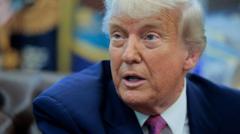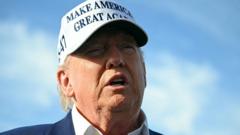Amid the backdrop of President Trump's increased global tariffs in recent months, U.S. businesses have become increasingly vulnerable to illicit trade practices. Shipping companies, primarily from China, are reportedly reaching out to American importers in sectors like apparel, automotive parts, and jewelry, promoting methods to evade hefty tariffs. These practices often involve providing misleading information about the goods being shipped or reshuffling products through third countries to benefit from lower duty rates.
**Escalating Trade Fraud: U.S. Companies Struggle with Tariff Evasion Tactics**

**Escalating Trade Fraud: U.S. Companies Struggle with Tariff Evasion Tactics**
As international trade policies tighten, U.S. firms report a surge in fraudulent practices aimed at circumventing tariffs, raising concerns about the government's enforcement capabilities.
**Summary:**
U.S. businesses are witnessing a rise in trade fraud exacerbated by increased tariffs instituted by the Trump administration. Companies are being approached by Chinese shipping firms offering methods to subvert the tariffs, leading to concerns about the efficacy of U.S. government oversight in curbing these practices. Executives have compared the government's response to a "Whac-a-Mole" game, illustrating the complexities of enforcing trade compliance.
U.S. businesses are witnessing a rise in trade fraud exacerbated by increased tariffs instituted by the Trump administration. Companies are being approached by Chinese shipping firms offering methods to subvert the tariffs, leading to concerns about the efficacy of U.S. government oversight in curbing these practices. Executives have compared the government's response to a "Whac-a-Mole" game, illustrating the complexities of enforcing trade compliance.





















